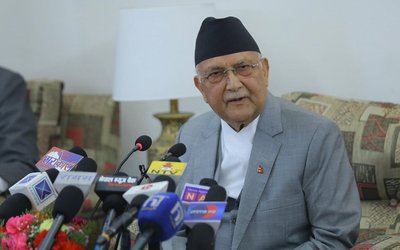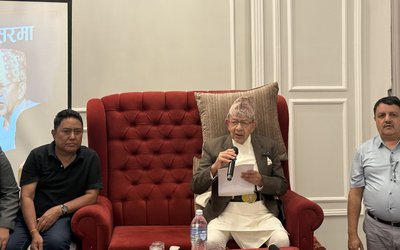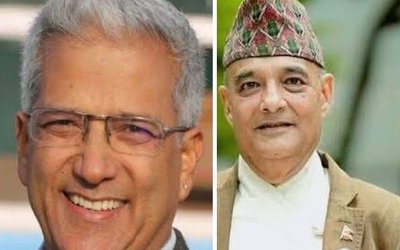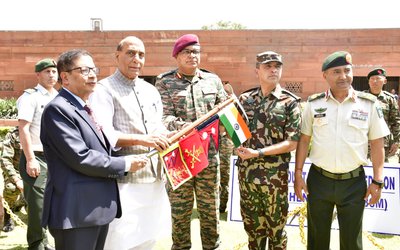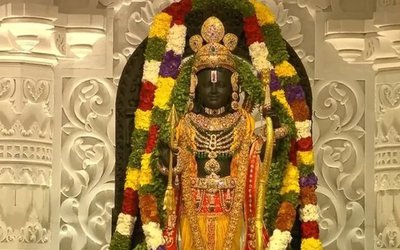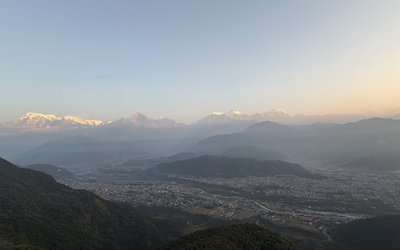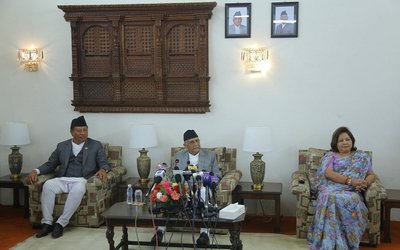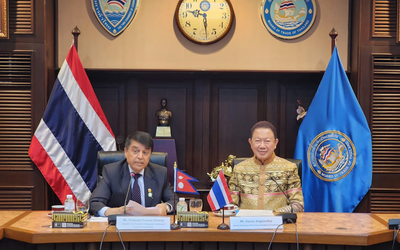Ganga Magar, 28, a resident of Kathmandu Metropolitan City, Ward No. 35, wakes up early in the morning and rushes to fetch a bucket of water from a tank placed at Minbhawan by the Kathmandu Upatyaka Khanepani Ltd. By the time Ganga reaches Minbhawan from Mahadevsthan of Koteshwor, hundreds of women will have reached there before the break of dawn to queue for the drinking water.
“Along with my other neighbors, I reach Minbhawan as early as 4 AM, to be among the first few to fill our buckets. If I am fortunate, I get water. Sometimes, I need to come back empty-handed because the water runs out in KUKL’s water distribution tank,” said Ganga.
At a time when Nepal boasts to be a country where women are leading the nation's three top positions, of the President, Chief Justice and Speaker of Legislature Parliament, the state of women like Ganga has not changed much.
Many women even suffer from bigamy and polygamy. Kabita Shrestha (name changed), 25, a resident of Dhading district, faced all kinds of physical violence before she finally sought divorce when her husband chose bigamy.
“Whether there is a female president or male president, it does not make much of a difference to me and thousands of others like me. We continue to suffer from domestic violence, discrimination and abuse,” said Shrestha. “My husband took everything and I don’t know what to do with my two children.”
The tale of Durga Keshari, 35, is different as the state denied the citizenship of her children because of her failure to identify her husband. Despite the claims that the three major political parties make about the flexibility of the citizenship provision in the constitution, many rigidities still discriminate against the women.
“My two daughters are yet to get the citizenship even as I possess my citizenship certificate,” said Keshari.
According to the Women Commission, it received 203 complaints in the last eight months. Out of them, 161 are related to domestic violence. Similarly, the Women and Children Service Center of the Kathmandu Metropolitan Police received 1044 complaints related to domestic violence, with 180 complaints lodged against husbands. According to Nepal Police, 787 complaints were settled through compromises.
The complaints related to domestic violence include deformation, mental torture, physical torture, partition and related issues. The immediate cause of most of these incidences is alcohol, economic condition and dispute with family members.
Of the 37 complaints filed in the court, 31 were settled. Since the court process is slow and complicated, it takes years for the court verdict. “Women are insecure from their own family members and relatives,” said Bhagbati Ghimire, acting chairperson of Women Commission. “Although we receive many complaints, the commission does not have adequate budget to provide social security to women.” The commission does not have shelter either to keep the victims of violence. Non-governmental organizations are not enough, what is required is women’s active involvement to punish the offenders.”
According to Domestic Violence (Crime and Punishment) Act, 2008, victim of domestic violence can register written complaint against anyone. However, the act is not implemented properly. Member of National Human Rights Commission Mohana Ansari holds the view that the current state is the result of lack of coordination among different organizations.
“Our cell acts against perpetrators whenever we receive complaints from victims,” said Inspector Suvadra Lama, head of the Nepal Police Unit, Kathmandu.
Although the lives of girls and women living in urban areas have changed dramatically over the last one decade, with the constitutional and legal rights in place, rural and illiterate women and girls are still suffering ordeals. Despite the existence of difficulties, such as Ganga and Shrestha are facing, more girls and women are literate now than even before. Girls outnumber boys in schools.
Women have been playing a greater role in politics with over 33 percent of representatives and their involvement in the civil service has also gone up. The life expectancy of women has also increased. The pace of change has been astonishing. The grim pictures of women, however, are also travelling together.
With the slogan of equality and inclusion, the new constitution was promulgated in 2015. Under a provision of the new constitution, Bidya Bhandari was elected as president, Sushila Karki was appointed chief justice of the Supreme Court and Onsari Gharti became the speaker of Legislature Parliament.
This change in the center has no impact on the life of an overwhelming majority of women like Ganga and Shrestha.
Despite many achievements, maternal mortality rate continues to kill women. Domestic violence and women trafficking continue unabated. Even the newly promulgated constitution has denied some citizenship rights for women.
Growing Disparities
The progress towards gender equality has been lackluster in many parts of Nepal. Girls and women, who are poor, living in remote areas areas, disabled and dalits, are still left far behind.
Disparities among urban-rural and urban-urban women are growing. Within the urban areas, thousands of women like Ganga are living under absolute poverty, spending their valuable time fetching buckets of water.
In far western and mid-western Nepal, Chaupadi system continues to exist. Some women still die at sheds during their menstruation period. Despite a ban imposed by the Supreme Court on the Chaupadi tradition, in 2005, it is still widely practiced in the mid and western regions of Nepal. Hundreds of other young women are dying in absence safe-abortion clinics.
As women start making money and getting educated, one can see a lot of change occurring in their lifestyle. Many urban women are driving cars, scooters and motorbikes and 33 percent women representations has enhanced their prospects at the local level, too.
The participation of women in civil service and other work place has gone up. Girl’s enrolment has increased. In higher education sector, particularly in technical education, including health and engineering, the participation of women is huge and impressive.
Citizenship Issue
Although the new constitution has been promulgated, it has not solved the issue of citizenship. Women activists are saying that it has many discriminatory provisions, such as its denial of the right to mother.
“Currently, more than four million Nepalis are without citizenship and research indicates that women are 75% less likely to own a citizenship certificate compared to men. Not owning a citizenship certificate has a multitude of impacts, such as not being able to secure official employment, own land and property, or even obtain a SIM card to operate their mobile phones. This is on top of the vulnerability that statelessness already brings to various socio-economic challenges such as limited access to resources and opportunities. For example, citizenship is needed to gain admission into schools and universities, to practice one’s profession and/or pursue socio-economic ventures, to open a bank account or seek a loan, and to have the right to vote,” writes a young woman activist Ojaswi Shah in her blog.
With listing of citizenship as a contentious constitutional issue and with considerable struggle “and” has indeed been substituted with “or” in Nepal’s new constitution. Article 11.2.b provides citizenship by descent to all children born to parents, one of whom is a Nepali citizen. Now with the removal of “and” at least citizenship can be acquired through the father.
The requirement to be born in Nepal to gain naturalized citizenship has been removed for children of Nepali women married to foreigners. Article 12 of the new constitution allows for the citizenship certificate in either of the parents’ name and also carries their gender identity.
According to the provision of new constitution, the child of a single woman must be born in Nepal to obtain citizenship by descent. generally two principles apply in conferring citizenship: jus sanguinis (by blood) and jus soli (by birth). Nepal has applied only one principle: that is jus sanguinis.
Further, to make it restrictive only for women, the constitution also requires that for women their children need to be born in Nepal to obtain citizenship by descent. With this requirement, a different standard is clearly and egregiously applied to the children of Nepali women, whereas this is not applied to the children of Nepali men. What then will happen to the children of trafficked women, migrant women workers and other transient women whose offspring are born outside Nepal? Since mother is identified, Article 11.4 will not be applicable. And since the child is not born in Nepal, citizenship cannot be obtained under Article 11.5.
“The child of a Nepali woman can only obtain naturalized citizenship if married to foreigner. On the one hand Nepali women have the right to marriage, which includes the right to marry as per one’s own choice, whether the spouse is Nepali or foreigner. But if the spouse is a foreigner, the children of Nepali women are only entitled to naturalized citizenship under Article 11.7, whereas the children of Nepali men married to a foreigner spouse are entitled to citizenship by descent. Thus, for the children of Nepali citizens, there is a bias in their treatment based on their birth to a Nepali chhori or bideshi buhari,” said a constitutional lawyer.
According the constitutional lawyer, constitutional rigidity and discrimination apply only to Nepali daughters. Also naturalization is not a matter of right in Nepal, it is at the discretion of the state. Inequality is also perpetuated on citizenship by naturalization in other entitlements under the constitution.
The Nepali woman has to establish that her father is Nepali. Ultimately it is the mother who has to prove the father of the child. Therefore in claiming citizenship through the mother, females have to prove first that the husband is not a foreigner and then her husband is Nepali due to other subsequent articles and provisions in the constitution and if she cannot prove this, or if her husband denies their relationship, or in case of violence, her child may not be able to obtain Nepali citizenship.
Although Article 11.7 does say that while acquiring citizenship if both parents are Nepali, children can get citizenship by descent. “However, if foreigner husbands are excluded from Article 11.6 in getting citizenship based on marital naturalization, how can any child born to a Nepali mother married to a foreigner obtain citizenship by descent?,” asked a constitutional lawyer.
“Therefore, the citizenship provisions in the Constitution of Nepal 2015 explicitly discriminate against Nepali women and consider them to be second-class citizens, continuing to treat women based on the dependent notion of nationality. This is not only against Article 9 of the Convention on Elimination of Discrimination Against Women but also against the Convention on the Nationality of Married Women-1957 and the Convention on Child Rights-1989,” he argues.
Misogyny is clearly evident as driving the citizenship chapter in the new constitution: the right to family and the right to non-discrimination based on marital status, as well as patriarchy as a reason for discrimination and injustice have all been removed.
“Further and more worrying, if discrimination in citizenship is thus explicit in the constitution, its unconstitutionality cannot be tested by the Supreme Court, as it is subject to constitutional amendment!,” writes a senior advocate, who is now justice at Supreme court.
Although Nepal has been celebrating the International Women's Day for the last many years, nothing has changed much. For a majority of women, it does not make any essential difference in matters of their citizenship rights, be the constitution old or new.

Keshab Poudel
Poudel is the editor of New Spotlight Magazine.
- FM Dr. Deuba’s India Visit: Mission Aborted
- Mar 26, 2025
- AMBASSADOR MAEDA TORU: Warm Regards
- Mar 24, 2025
- PRO-MONARCHY MOVEMENT: Rising Dissatisfaction
- Mar 23, 2025
- Dr. PRABIN MANANDHAR: Person With Humility
- Mar 16, 2025
- US SUSPESION OF GRANT: Impact On Nepal
- Mar 10, 2025
